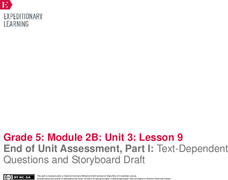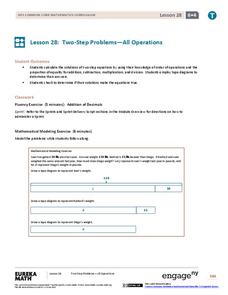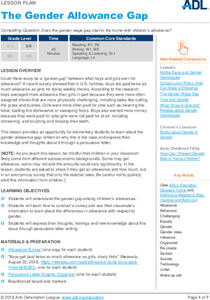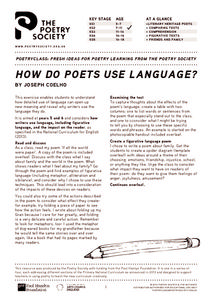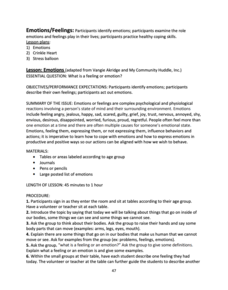Missouri Department of Elementary
The Clique
Mean girls and bully packs are favorite topic for films and TV shows that focus on the destructive power of cliques. High school freshmen are asked to reflect on both the positive and negative aspects of cliques by reading a short...
EngageNY
End of Unit Assessment, Part 1: Text-Dependent Questions and Storyboard Draft: “You Can Do a Graphic Novel” Excerpt
Eyes on the finish line. Serving as the first part of the end of unit assessment, learners answer questions based on a text about how to write a graphic novel. Using what they've learned, they then create a storyboard about the invention...
Brigham Young University
Out of the Dust: Guided Imagery
A guided imagery exercise is a great way to get readers thinking about writing. As part of their study of Out of the Dust, Karen Hesse’s 1998 Newbery Medal winning verse novel, class members listen to a reading of one of the poems from...
Newseum
Propaganda Through History: Analyzing Historical Sources
Working in teams, pairs, or individually, scholars select one resource from a gallery of historical sources and consider which examples might be considered propaganda, the techniques used to persuade audiences, and evaluate how the...
NOAA
Technology II
Ping, ping, ping. The last installment of a 23-part NOAA Enrichment in Marine sciences and Oceanography (NEMO) program explores technology use in marine studies, such as sonar. Activity involves simulating sonar techniques to identify a...
Global Oneness Project
Resurrecting a Home
Davina Pardo's documentary Minka asks viewers to consider that value of preserving traditional dwellings and traditional building techniques by examining how American journalist John Roderick and Japanese architect Yoshihiro Takishita...
EngageNY
Two-Step Problems—All Operations
Step 1: Use the resource. Step 2: Watch your class become experts in solving two-step problems. Scholars learn to solve two-step word problems in context. They use tape diagrams and algebraic techniques to break the problem into two,...
EngageNY
End of Unit Assessment: Text-Dependent Questions and Draft Editorial: The Mary River Project on Baffin Island
Scholars complete an assessment, read an informational article, and answer text-based questions. Also, pupils use the Painted Essay technique to write a draft editorial about a topic they studied throughout the unit, the Mary River Mine...
Willow Tree
Problem Solving
School subjects connect when your young scholars use math to edit English. Math allows you to convert an entire paragraph into a simple equation or inequality. Examples encourage learners to write expressions, equations, and inequalities...
Curated OER
Putting it Together: Analyzing and Producing Persuasive Text
Young orators demonstrate what they have learned about persuasion and persuasive devices throughout the unit by analyzing a persuasive speech and then crafting their persuasive essays. Class members engage in a role-play exercise, use...
Anti-Defamation League
The Gender Allowance Gap
Does the pay gap begin with allowance? That is the big question scholars answer in a lesson examining how gender affects how much money an individual earns. Class members conduct a survey to identify how the allowance is paid, take their...
EngageNY
Grade 9 ELA Module 3, Unit 2, Lesson 3
Ninth graders hone their research questions in a lesson focusing on accurate search engine techniques. Continuing a unit on inquiry-based learning based on Temple Grandin's Animals in Translation, the lesson guides learners through the...
EngageNY
Discussing and Identifying Themes: What Makes a Good Children’s Book?
Working in small groups, scholars look closely at a children's book to evaluate narrative techniques. Next, they complete a Children's Book Scavenger Hunt worksheet to analyze the literary elements of their selected stories.
Missouri Department of Elementary
To Give In or Not to Give In—That Is the Question!
No! A very simple word that can be very hard to say. Seventh graders have an opportunity to practice this difficult skill as they engage in a series of role-playing scenarios. As an exit ticket, 7th graders write a reflection on the...
Missouri Department of Elementary
Opportunity Knocks, But It Costs, Too!
Sixth graders practice six steps to effective problem solving. Working with the school counselor, class members are presented with a scenario that requires them to make a decision. Individuals then write a reflection in which they...
Channel Islands Film
Lone Woman of San Nicolas Island: Lesson Plan 3
Should researchers be able to excavate, examine, and remove Native American artifacts from historic sites? Should companies be permitted to build on sacred Native American land? After watching West of the West's documentary, The Lone...
Poetry Society
How do Poets Use Language?
Why do writers choose the language they do? Here's a resource that has the poet himself answer that very question. Joseph Coelho explains why he chose the words and images he used in his poem, "If All the World Were Paper."
Literacy Design Collaborative
The Art of Persuasion: How Rhetorical Devices Influence Audiences
Scholars analyze a variety of text to identify the development of claims and persuasive techniques writers use. In each text, pupils determine the argument and the persuasive techniques and complete a task introduction worksheet. The...
Nemours KidsHealth
Stress: Grades 3-5
Two activities focus on stress—common stressors and coping strategies. In the first activity, scholars identify stressors and explore ways to keep stress away. To aid the process, learners create a poster and complete a handout...
Overcoming Obstacles
Developing a Positive Attitude
The third lesson in the Goal Setting series looks at the impact of a positive attitude on achieving one's goals. Participants create and then share visuals that represent positive attitudes. They then brainstorm ways to develop positive...
San Diego County District Attorney
Emotions/Feelings
Three lessons delve deep into the topic of feelings and the importance of expressing one's emotions. Through grand conversation, hands-on learning experiences, and reflective writing, scholars interpret the ups and downs of everyday...
EngageNY
Launching the Performance Task: Prompt, Characters, Groups
Scholars unpack the word confession as they prepare to write confessionals based on characters from Shakespeare's A Midsummer Night's Dream. Next, they read their narratives to a small group of peers as part of a final performance task.
Western Justice Center
Communication Skills
Good communication skills are key to resolving conflicts. A short video introduces learners to the concept of active listening and provides tips that will help them resolve conflicts. Class members then read articles, analyze scenarios,...
EngageNY
Researching Part 2: Reading for Gist and Gathering Evidence Using the Researcher’s Notebook
The gist should be short and sweet! Pupils practice finding the gist of an informational text and then write a summary of the text. Next, they gather with their research teams to discuss a focus question based on the novel Bud, Not Buddy...
Other popular searches
- Writing Technique Persuasive
- Timed Writing Technique
- Review Writing Technique
- Analyze Writing Technique
- Writing Technique Gt
- Evaluate Writing Technique
- Nonfiction Writing Technique
- Writing Technique Clerical
- Writing Technique Rubric
- Writing Technique Writing Type
- Writing Technique Closing
- Writing Technique + Closing



